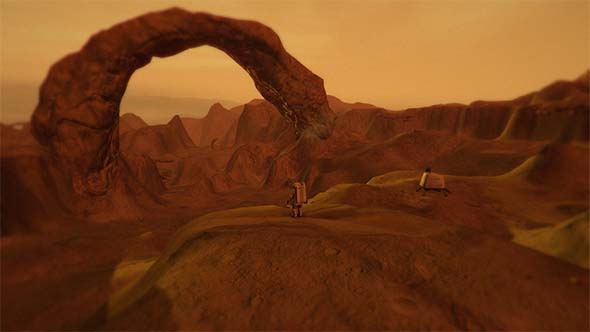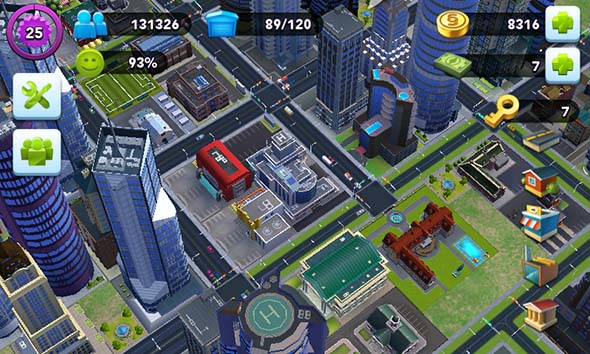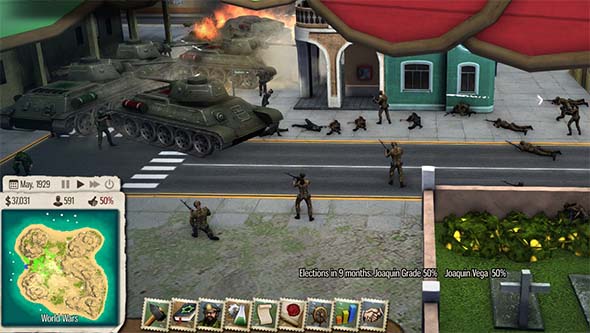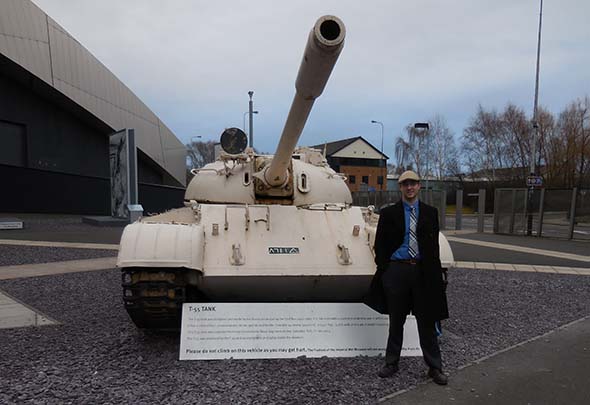
With Civilization V apparently at the end of its life cycle and unlikely to receive any more major updates or expansions, it's time to start looking to the future of the franchise: Civilization VI. Civ V was successful enough to spawn several spin-offs: Beyond Earth, Civilization Revolution 2 on mobile devices, Civilization World, and even a Civilization MMO. So it's reasonable to assume that if work hasn't already started on Civlization VI, then it will begin soon.
One of the things that I most love about Civ V is that each civ has unique powers that give them their own playstyles and flavors. The expansions (especially Brave New World) showed a lot of creativity with some of the civilizations. I hope that these design philosophies continue, and that we'll see some even more interesting gameplay variations in the new civilizations of Civilization VI.
To that end, I have a few ideas and suggestions for designs and themes for some of the common civilizations that are likely to appear in Civilization VI. I'll provide at least a unique abilility and at least two unique units / buildings / improvements, but I may also provide additional or alternative unique suggestions in case Firaxis decides to include even more variety and specialization. Since Civ VI will likely be a whole new game on a whole new engine, I can't give specific examples of the mechanics of these ideas. Instead, I'll try to focus on more broad concepts and maybe include examples based on Civ V's mechanics and features if relevant.
* NOTE: this post is a work-in-progress, and will probably be revised as I come up with additional ideas or clarifications. [More]
38b32f22-6121-4eec-82dd-ddc90cb4ce5d|0|.0
Tags:Sid Meier's Civilization, civilization, ability, unique, America, minuteman, Egypt, Nile, war chariot, Greece, city state, philosophy, hoplite, Huns, Mongols, nomad, Japan, Bushido, samurai, katana, dojo, ninja, Rome, road, legion, forum, Byzantium, cataphract, musketeer, immortal, MiG fighter, spitfire, Civilization III, Civilization IV, Civilization V, Civilization VI

Being someone who appreciates good science fiction and has an interest in real-life space exploration, it's easy for me to become intrigued with any game that promises to let me explore an alien world. Lifeless Planet promised to let me do just that, so it was a no-brainer Steam Summer Sale purchase for me last year, despite the mediocre critical reviews.
The basic premise of the game is that you play as a colonist sent to alien planet thought to be rich in life and habitable for humans. You wake up from cryo-sleep to find your ship has crash landed and your two crewmates are missing. Worse yet, the planet you crashed on seems to be a desolate wasteland devoid of life.
Are you even on the right planet? If so, where's all the life?

And we're off to find our missing crew-mates and figure out why the planet is lifeless.
From here, you set off to follow the tracks of your fellow crew mates in an attempt to find them and figure out where you are. Things get complicated very early on when you find a long-abandoned Soviet village. Wherever you happen to be, the Ruskies beat you to it!
But this just opens up even more questions: how did the Russians get here? And where did they all go? The mysteries behind these questions are supposed to be the driving force behind the game.
The bulk of the game, thus consists of wandering around the various alien landscapes in search of answers. This exploration requires a moderate amount of fairly trivial platforming, and you stop occasionally solve an elementary puzzle.
Platforming is mostly comfortable and works adequately. You have a malfunctioning jet pack that allows you a small boost to elevate you to higher platforms, jump longer gaps, or soften your fall. I had some occasional problems with the character sliding off of the geometry, and there were a couple areas late in the game that required multiple jumps without stopping that were difficult to control accurately. But other than that, the challenge of the platforming was minimal. The intended route is always obvious, so there was never any question about where I was supposed to go.

Your jet pack allows you to clear pitfalls and jump over large obstacles.
Puzzles aren't much more of a challenge. They are almost all environmental or physics puzzles that vary from "find the key" to "put the rock in the hole" to "push the boulders". There's nothing here that a grade-schooler couldn't figure out.
The rest of the game is just a steady walk along the linear paths ...
[More]
644391df-c7c0-4240-9d5b-33dfda1071c1|2|3.0
Tags:Lifeless Planet, Stage 2 Studios, Lace Mamba Global, Steam, indie gaming, science fiction, space, exploration, colonization, astronaut, platform, puzzle, adventure, allegory, Soviet Union, Russia, Cold War, portal, alien, plant, radiation, Achievement unlocked
A friend of mine introduced me to the social game SimCity Buildit, currently available for mobile devices and tablets. Since I currently lack a strong mainstream entry in the SimCity franchise, I thought I'd see if this social game does anything to fill my long-neglected need for spline-reticulation or if it presented any new features that could be worth pursuing in a full PC version of the game. I don't generally play social games. I dabbled a bit with CivWorld and Sims Social, but that's about it. So I lack a lot of reference for judging SimCity Buildit in terms of other social games.

Most of the fundamental SimCity elements are here: you set housing, commercial, and industrial zones, link them with roads, and build service buildings in order to satisfy various citizen needs within a certain radius. None of the deeper simulation elements of newer city-builder games are there. Individual citizens don't exist; there's just an abstract population, and happiness levels are set for each residential building. It's understandable for the limitations of the platform, and it provides a retro quality that reminds me of the good ol' days of SimCity 4.
But since this is a social game, the design has to put up numerous barriers to restrict the player's freedom to construct the city that they want. You have to "level up" your city by building new buildings. The number of residences that you can build, as well as the availability of industry and shops are also limited by your level or by the city population.
You also don't really have an economy to manage - at least not in the traditional sense. Citizens don't work at factories and shops. Instead, these buildings create certain building materials that are used to "upgrade" your residences into higher-density buildings that generate more tax revenue. This provides the core challenge of the game: you have to build the necessary materials in order to upgrade your buildings. Each of these materials take different amounts of real time to construct in your factories and shops (or you can buy the materials you need through real-money micro-transactions). As you level up, you'll unlock new materials, which residences will suddenly demand in order to upgrade their buildings.

You don't have to manage employment, tax rates, or city ordinances; only resources and service coverage.
The ability to upgrade a building seems to be limited by its happiness level. Only happy residences can be upgraded, so you also need to provide city services such as power, water, waste disposal, emergency services, entertainment, and so on. But these services are very frustrating because they are tied to your city level. New services or entertainments become unlocked when you level up. That's fine. But once those services are unlocked, your entire city starts demanding them, and happiness plummets (as well as tax income, which is tied to happiness) because you don't already have the infrastructure ... [More]
32090159-6899-4ab5-bbd5-d5b6d927f5a0|0|.0
Tags:SimCity, SimCity Buildit, Electronic Arts, EA, Track Twenty, online, social gaming, mobile, mobile gaming, Facebook, Google Play, city simulation, public service, disaster, industry, supply

Without a decent, new iteration of SimCity for me to play, I've been looking high and low for new city simulator games in order to scratch that particular itch. I spent a large chunk of time a few years ago playing Cities XL, but never got around to reviewing it (maybe I'll post aretro-review in the future). Cities XL has so far been the best of the bunch and has a very wide scope, but it's developer has folded, and the game has never truly felt complete.
So I've started looking at more niche titles. I gave Children of the Nile and Caesar IV a go a few years ago, and both were pretty good, but just didn't hold me over for very long. So when Tropico 5 went on sale on Steam, I picked it up and put it on the shelf till I took a break from Civ. The game has also been released on XBox 360, and it has also been announced for a PS4 release sometime in 2015, but I've been playing the PC version.
The primary gimmick of the Tropico series is that the player isn't a mayor (as most city simulators claim); instead, you play as a dictator who is granted governorship of a small Caribean island-nation by a European power. It's basically a Cuba-simulator. At the start of a game, you must create a dictator avatar, and that character can have children and heirs in order to maintain your dynasty. From a meta standpoint, this gives much greater justification for the breadth of power that the player has over the development of the city. But this dictatorial theme isn't just a gimmick; the game actually does use it for gameplay purposes.

Poor management of relations with internal factions and external nations
can lead to revolts and open warfare on your streets.
In addition to balancing workers versus jobs and various citizen satisfaction metrics, the player also has to worry about maintaining your position of power and dealing on the international stage. Much like the Democracy games, the player actually has to win elections in order to avoid losing the game, and so you must balance the favor of various competing factions. It's nowhere near as deep as Democracy, since there's only about four factions (which change depending on the current era), but it does add an extra challenge that a game like SimCity lacks. After all, your mayor-hood in SimCity is indisputable.
It can be hard to manage the favor of these various factions and their members, since it's hard sometimes to tell exactly what is making them happy or unhappy... [More]
17ea369e-93b8-4f10-b3b6-1fc816c34f27|0|.0
Tags:Tropico 5, Haemimont Games, Kalypso Media, PC, Steam, strategy, city simulation, government, public service, industry, communism, socialism, capitalism, dictatorship, island, World War I, World War II, Cold War, United States, Soviet Union, Cuba, plantation, colony, election
The company that I work for is switching over to using a new set of software for our products. Because of this, several members of our development staff were required to travel to our development studio in Manchester, United Kingdom in order to be trained on the new software.

Downtown Manchester, January 30, 2015.
As one of the senior developers in my office, I was asked to be one of the representatives of our studio for this training, and I had the good fortune of being able to go on my very first trip abroad. It wasn't technically my first visit to a foreign country, as I've visited Canada several times. Nor was it my first trip over an ocean, since I've visited Hawai'i. But the trip to Canada was many years ago; before a passport was even needed to cross the border, so it didn't feel like as big of a deal.
The training element was a bit underwhelming. The training schedule coincided with a major release deadline, so the engineer who was supposed to be providing the training and answering our questions had limited availability due to some last minute crises that he had to handle. So instead, we had a room full of people from different development studios in different countries all trying to bumble our way through the new software together.
But we did still learn some things, and even taught the lead engineer a thing or two!
A piece of advice to tech companies: don't schedule training sessions to begin a couple days before a major software release deadline - especially if you are flying developers in from halfway around the world to participate.
A British perspective on the World Wars
It wasn't all work though. I did try to do some touristy things.
I arrived in Manchester early Sunday morning after a red-eye flight from Philadelphia. After checking into the hotel to drop off my luggage, I took the cable car trolley back into the city and visited the Imperial War Museum (North). The main museum is in London (which I did not get to visit, other than a lay-over on the return trip), but there is a small branch of the museum in Manchester as well.

A tank displayed outside the Imperial War Museum North in Manchester, U.K.
One of the interesting things about this museum (compared to most history museums in the States) is the emphasis on the domestic impacts of war. Several exhibits were dedicated exclusively to the effects that the world wars had on the general populace [More]
b37ea20f-7c00-4139-a8bb-679bd17503ac|0|.0
Tags:Manchester, United Kingdom, England, business, software, training, Imperial War Museum, London, Heathrow, Indian food, India Palace, India Ocean, vindaloo, spicy, Guiness, beer, pub, Old Wellington, nightlife, public transit, Britain, passport
|

| 12 | | | | | | | 60 | | 11 | | | | | | | 55 | | 10 | | | | | | | 50 | | 09 | | | | | | | 45 | | 08 | | | | | | | 40 | | 07 | | | | | | | 35 | | 06 | | | | | | | 30 | | 05 | | | | | | | 25 | | 04 | | | | | | | 20 | | 03 | | | | | | | 15 | | 02 | | | | | | | 10 | | 01 | | | | | | | 05 |
|